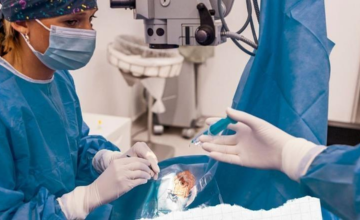- Email: info@swarupeye.com
- Hyderabad
- Call: +918886309030
Keratoplasty
KERATOPLASTY: THE CORNEA TRANSPLANT
Our team of expert ophthalmologists at Swarup Eye Centre is dedicated to providing the highest quality corneal transplant surgery, restoring sight and improving the quality of life for patients with corneal diseases or injuries.
Cornea is an optical surface which plays a vital role in focusing light on the retina within the eye. Corneal transplant is a surgical procedure in which the cornea is replaced with the donor's cornea, this procedure is also known as Keratoplasty.

Understanding Keratoplasty:
Keratoplasty is done to restore vision for a person with damaged cornea involves corneal dystrophies, tearing/thinning of cornea, keratoconus and corneal ulcers & scars. There are different types in Keratoplasty: Penetrating Keratoplasty, Anterior lamellar Keratoplasty and Endothelial Keratoplasty (these procedures are performed based on the corneal conditions of each person).
Outcomes of Keratoplasty:
- Restores the vision
- Reduce pain compared to damaged/diseased condition
- Slightly improves the appearance of cornea.
Uneventful outcomes of corneal transplant:
- Rejection of donor cornea
- Infection
- Astigmatism
Causes and Common Concerns:
- Corneal Ulcers: It occurs due to bacterial, fungal or viral infections.
- Keratoconus: It is a condition which leads to thinning and bulging of cornea.
- Bullous Keratoplasty: It is an inflammatory condition (a blister–like swelling) of the cornea.
- Fuchs dystrophy: It is a condition in which fluid builds up in the cornea due to hereditary corneal damage.
- Corneal scarring
- Ocular injury
Treatment Options:
Keratoplasty procedures are classified into different types based on the layers which are replaced during the surgery:
- Penetrating Keratoplasty (PK): This surgical procedure involves the full-thickness cornea transplant (entire thickness of diseased or damaged cornea removed in a circular cut and replaced with the donor cornea with help of sutures).
- Endothelial Keratoplasty: This surgical procedure involves the endothelium and Descemet membrane (innermost layers of cornea) which are replaced with donor tissues. Endothelial Keratoplasty is of 2 types:
- Descement stripping Endothelial Keratoplasty (DSEK): This procedure uses donor tissue to replace one-third of the cornea.
- Descement membrane endothelial Keratoplasty (DMEK): In this surgical procedure, uses a much thinner layer of donor tissue.
- Anterior Lamellar Keratoplasty: There are 2 different methods in this surgical procedure which includes epithelium and stroma.
- Superficial Anterior Lamellar Keratoplasty: In this procedure the anterior layer of the cornea is replaced with donor tissue.
- Deep Anterior Lamellar Keratoplasty: This procedure extends deeper into stroma and replaces the removed portion with donor tissue.
Expert Consultation at Swarup Eye Centre:
At Swarup eye centre, we assemble a team of specialists who take the time to listen and thoroughly understand your health issues and concerns. You can trust our specialists to collaborate and offer you the best possible outcomes, safety and services. Our Dr. Rishi Swarup at Swarup eye centre offers the most current technology and most advanced treatment options available for cornea transplants.
Frequently Asked Questions
- How long does a corneal transplant procedure take?
The procedure typically takes about 30-60 minutes, though this can vary depending on the specific type of keratoplasty being performed. - What is the recovery time after keratoplasty?
Recovery varies depending on the type of procedure. Full visual recovery after PK may take 6-12 months, while DSEK and DMEK procedures typically have shorter recovery periods of 1-3 months. - Will I need to use eye drops after surgery?
Yes, you will be prescribed antibiotic and steroid eye drops to prevent infection and reduce inflammation. These will be used on a tapering schedule as determined by your surgeon. - How successful are corneal transplants?
Success rates are generally high, with over 90% of corneal transplants remaining clear after one year. Long-term success depends on the original condition being treated and proper post-operative care.
